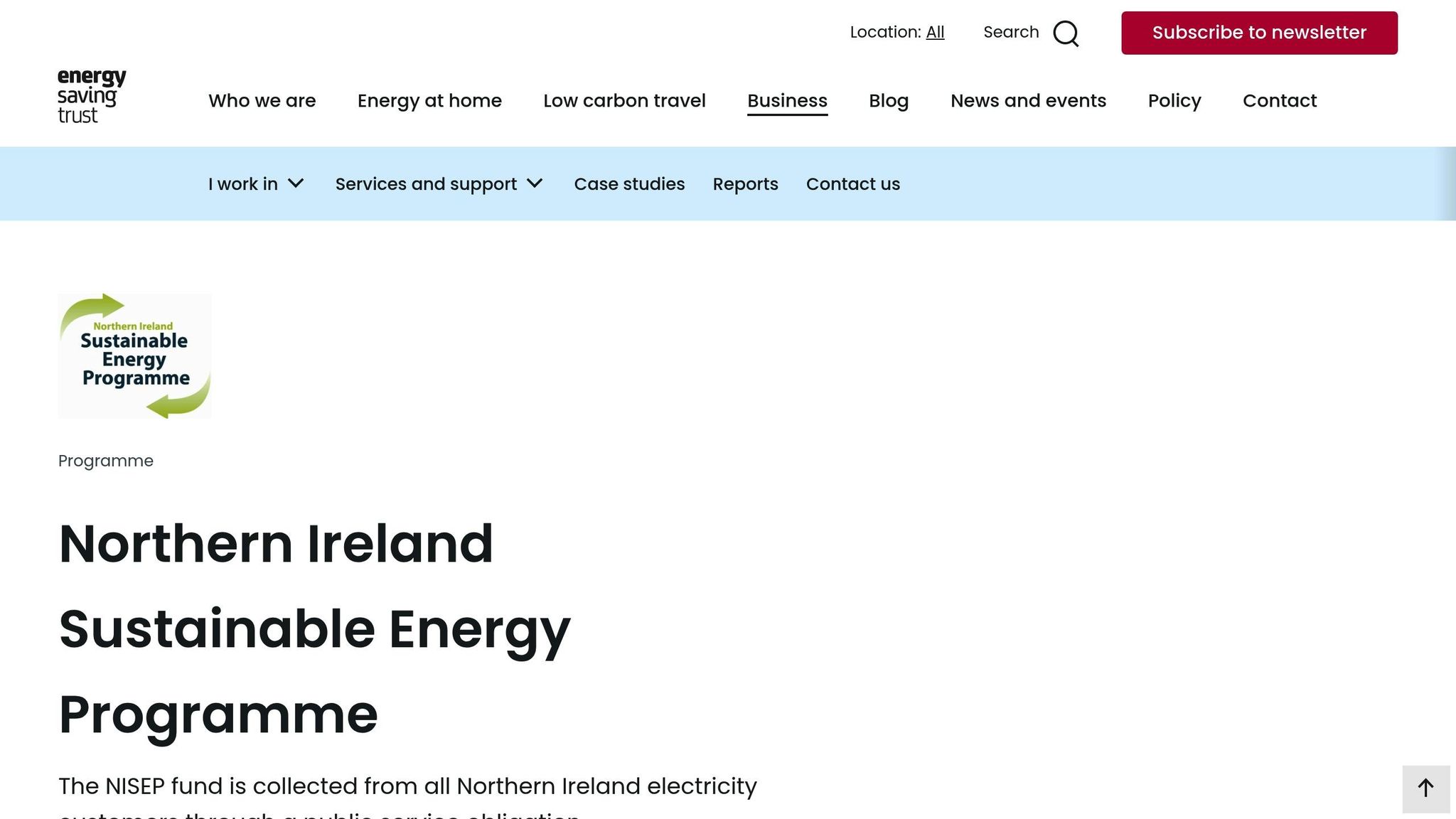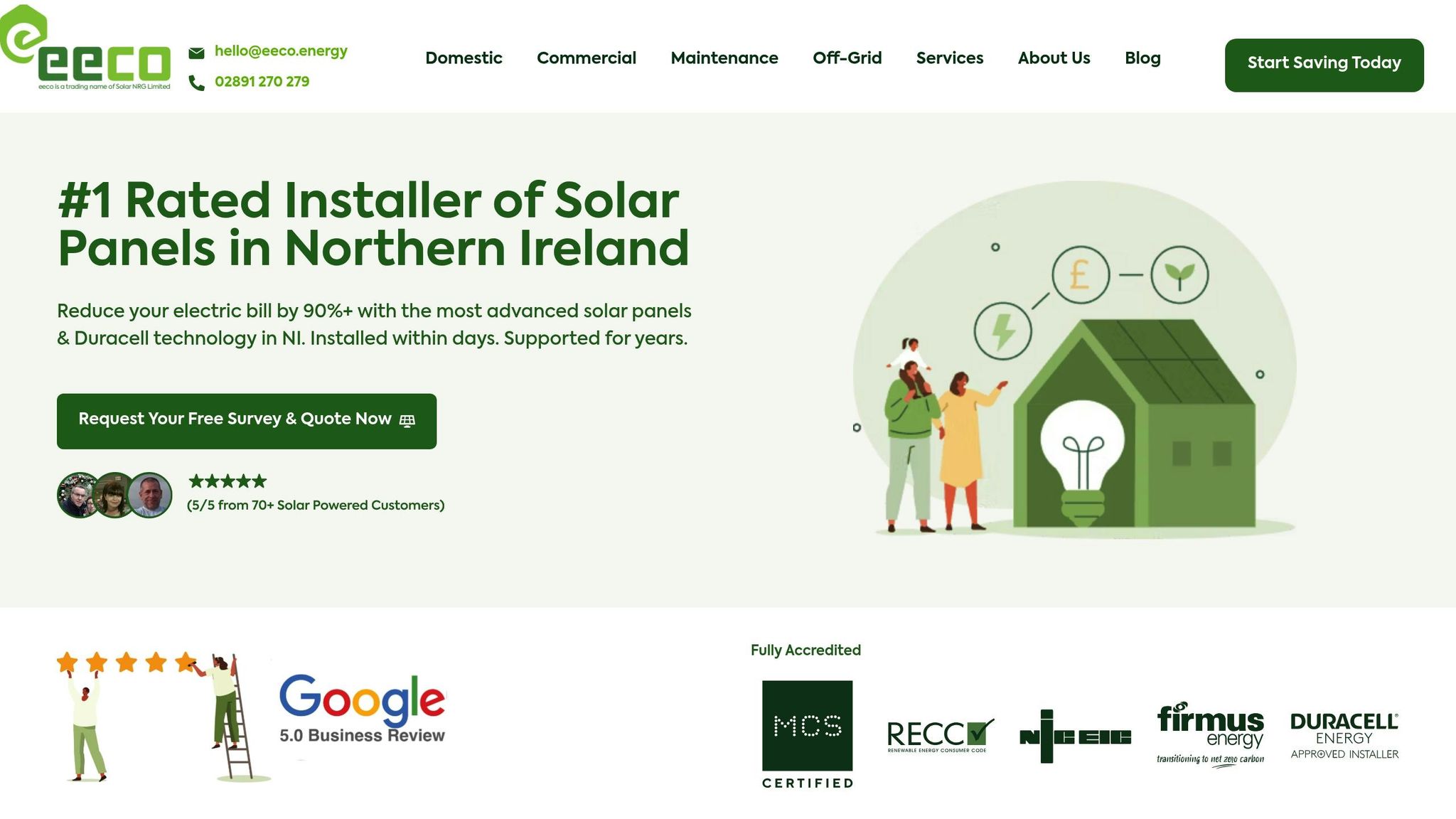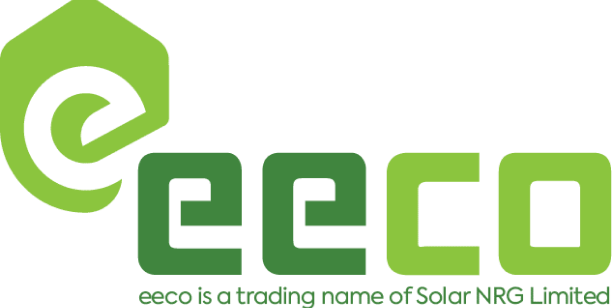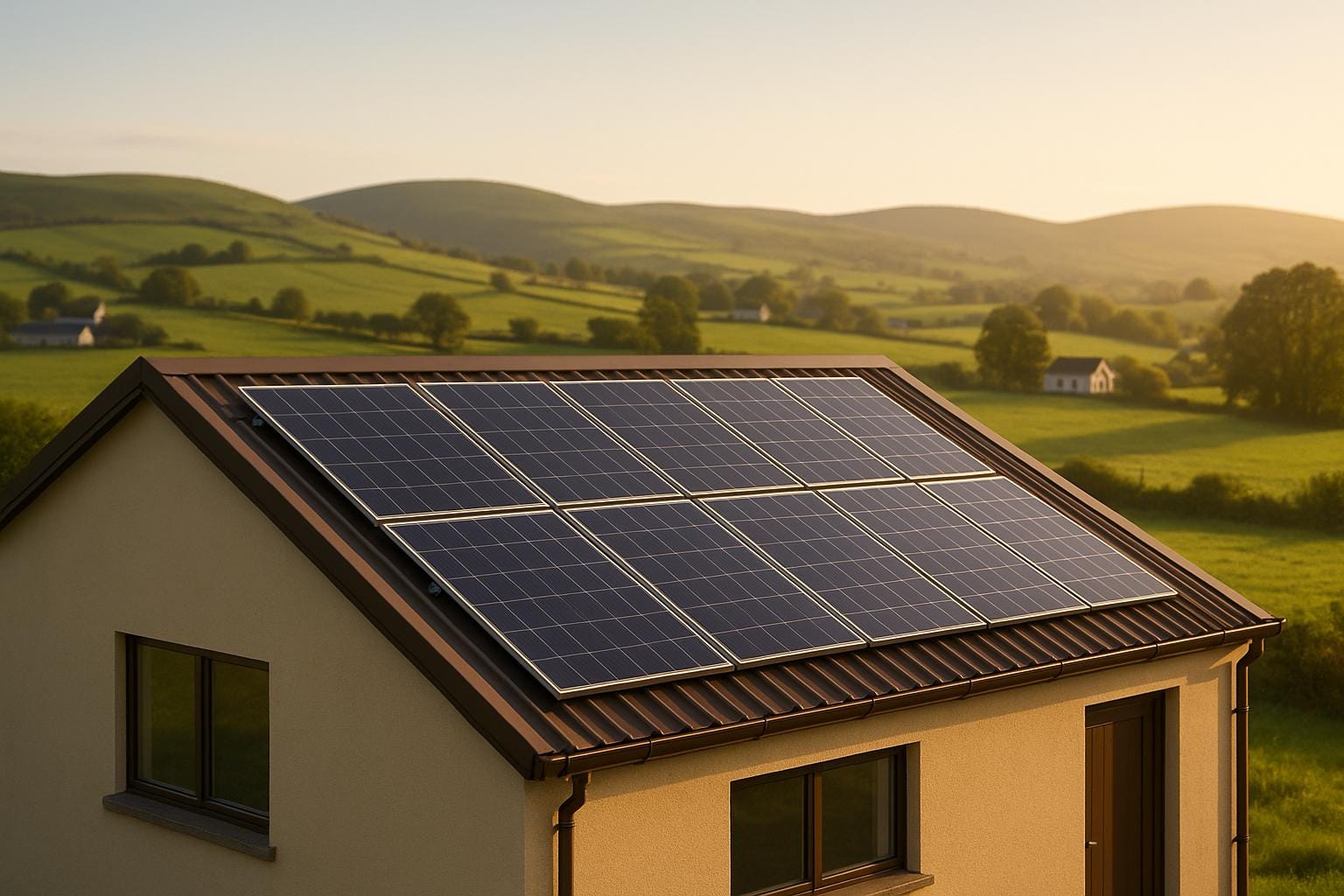Switching to solar energy has never been more accessible for small and medium-sized enterprises (SMEs) in Northern Ireland. With government grants, tax relief, and local council funding, businesses can reduce upfront costs and save on energy bills long-term. Key highlights include:
- 0% VAT on solar installations: Reduces project costs by 20%.
- Northern Ireland Sustainable Energy Programme (NISEP): Offers financial support for solar projects.
- Local council funding: Additional grants tailored to regional needs.
- Smart Export Guarantee (SEG): Earn income by selling excess energy back to the grid.
Eligibility varies, but most schemes are open to businesses with at least two years of operation. Partnering with MCS-accredited installers simplifies the application process and ensures compliance with funding requirements.
Solar power not only lowers energy costs but also provides a predictable, long-term solution to rising electricity prices. With added options like battery storage and EV charging integration, SMEs can further optimise their systems. Start with a free energy assessment to explore your options and secure grants today.
Grant Schemes and Financial Support Available
Various grant schemes are available to help SMEs in Northern Ireland lower the costs of installing solar systems. These programmes not only make solar energy more affordable but also encourage businesses to improve energy efficiency and reduce their carbon footprint.
Northern Ireland Sustainable Energy Programme (NISEP)

The Northern Ireland Sustainable Energy Programme (NISEP) is a government initiative designed to support businesses investing in solar energy. By offering financial assistance, NISEP helps companies achieve their sustainability goals while improving energy efficiency. Eligibility depends on factors like energy needs and sustainability targets. Additionally, businesses can benefit from tax relief measures, such as the 0% VAT on solar installations, to further cut costs.
0% VAT on Solar Installations
SMEs installing solar panels can benefit from a 0% VAT rate, making solar systems more affordable. This tax relief automatically applies to qualifying renewable energy systems, including panels, inverters, and storage solutions. By reducing the overall project costs, this measure encourages businesses to adopt or expand their use of solar energy.
Local Council and Regional Energy Grants
Local councils in Northern Ireland offer additional grants and fee waivers to support solar energy projects. These grants are tailored to regional priorities and often simplify the approval process for solar installations. Regional development organisations also assist businesses in combining different funding sources, maximising financial support and further reducing installation expenses.
Eligibility Requirements and Application Process
Understanding the eligibility criteria for solar grants is key for SMEs looking to secure financial support. Each grant programme comes with its own set of requirements, so it’s essential to identify which schemes align with your business needs. Below, we break down the types of businesses that qualify for various solar grants, helping you focus on the right opportunities.
Business Types That Qualify for Solar Grants
Northern Irish businesses with at least two years of operation are eligible for many solar grant programmes. For example, the Energy Efficiency Capital Grant (EECG) offered by Invest Northern Ireland requires businesses to meet specific conditions. These include registration for business rates at the project premises, a proven track record of sound financial management, and long-term ownership or lease of the premises.
Some organisations, such as sports clubs, charities, and farms, are excluded from the EECG programme. However, the Northern Ireland Sustainable Energy Programme (NISEP) provides an alternative. NISEP has widened its scope to include all businesses in Northern Ireland, offering grants for green technology installations and energy efficiency improvements. This makes it a valuable option for businesses that might not qualify for other schemes.
The Sustainable Community Buildings Programme is another option, open to businesses with premises in Northern Ireland. Eligibility for this programme can vary depending on the local council area and the timing of applications. Its focus is on enhancing the environmental performance of business premises while promoting sustainability.
It’s worth noting that the EECG paused in April 2024 for a performance review, and its eligibility criteria may change when it resumes. Additionally, the Industrial Energy Transformation Fund (IETF), which previously supported energy-intensive businesses, closed on 19 April 2024 and is no longer accepting applications. These changes highlight the importance of staying informed and selecting the most suitable grant programme for your business.
Financial Returns from Solar Energy for SMEs
Investing in solar energy can lead to significant long-term savings and better cash flow for small and medium-sized enterprises (SMEs). Beyond the initial funding support, solar installations provide ongoing financial benefits that make them an attractive option for businesses.
Grant Support and Funding Opportunities
One of the biggest hurdles for businesses considering solar power is the upfront cost. Fortunately, grants like those offered through the Northern Ireland Sustainable Energy Programme (NISEP) help ease this burden. In addition to NISEP, regional programmes and local councils often provide extra funding to make solar projects more affordable for businesses of all sizes. These grants not only lower the initial investment but also pave the way for businesses to enjoy the consistent savings that solar energy brings to their monthly energy bills.
Lower Energy Costs and Additional Income
By generating their own electricity, businesses can significantly reduce their energy bills. But the financial benefits don’t stop there. Through schemes like the Smart Export Guarantee (SEG), SMEs can sell any surplus energy they produce back to the grid, creating an additional revenue stream. This combination of cost reduction and income generation enhances the overall financial appeal of solar energy.
Maximising Financial Returns
When you combine grant funding, 0% VAT on solar installations, and the savings on energy bills, the financial returns are hard to ignore. Many SMEs find that the payback period for their solar investment is relatively short, and the ongoing savings continue to improve cash flow. Adding battery storage to the system can further increase these savings by allowing businesses to store excess energy for use during peak times, maximising the value of their investment.
sbb-itb-d2d975a
Professional Services and Solar Installers in Northern Ireland
Getting solar systems installed and navigating grant applications can be a complex process, especially for SMEs that may lack the necessary expertise. Partnering with skilled solar installers who know the ins and outs of both the technical aspects and the funding process can save time, money, and headaches. These professionals play a crucial role in ensuring your project is both financially viable and technically sound.
Help with Grant Applications and Energy Assessments
Applying for grants typically involves a lot of paperwork, detailed energy assessments, and strict compliance with regulations. Experienced solar installers handle these tasks by conducting comprehensive site surveys, estimating energy generation potential, and preparing all the documentation needed for grant applications.
Many reputable installers offer free initial assessments, which include checking roof suitability, calculating potential shading issues, and estimating energy output. These evaluations not only support grant applications but also help determine the best system size for your business needs.
Working with MCS-accredited installers is essential for most grant programmes. This certification guarantees that installations meet the technical standards required by funding bodies. These professionals also tailor their approach to different types of businesses, whether it’s a manufacturing plant or a retail outlet, ensuring your application meets all the necessary criteria.
EECO Energy: Solar Solutions for SMEs

EECO Energy simplifies the process for Northern Ireland SMEs, offering a complete service from grant applications to system installation. Their tailored solar solutions combine technical know-how with a deep understanding of local grant schemes and regulations. With their MCS accreditation, EECO Energy ensures all installations meet the eligibility requirements for funding.
They provide free surveys and quotes, delivering detailed energy assessments that strengthen grant applications. Their commercial solar systems and battery storage options are competitively priced to suit SME budgets.
Battery storage integration is a standout feature of EECO Energy’s services, offering options like Dyness 10kW batteries (£2,400), Soluna systems (£3,000), and Duracell batteries (£3,650). As an approved Duracell installer, they also provide 25-year warranties on complete systems, giving businesses peace of mind about their investment.
EECO Energy’s one-day installation service minimises disruption, while their comprehensive project management ensures all grant requirements are met from start to finish. They also offer EV charging station integration, allowing businesses to combine solar grants with funding for electric vehicle infrastructure.
Maintenance and Long-term System Support
To keep solar systems running efficiently and protect grant-funded investments, regular maintenance is essential. Professional maintenance services include annual inspections and performance monitoring to ensure energy generation stays on track.
Many commercial solar warranties require ongoing professional maintenance to remain valid. Maintenance contracts often include system monitoring, which allows businesses to track energy production and financial returns – helpful for meeting reporting obligations tied to some grants.
Installers typically offer comprehensive maintenance packages, covering emergency callouts, replacement parts, and performance guarantees. These services ensure your solar system continues to operate efficiently over its 25-year lifespan, maximising savings and protecting your investment for the long term.
Summary: Solar Grant Opportunities for SMEs
Northern Ireland’s SMEs have a fantastic opportunity to tap into grant funding and expert installation services to make solar energy more accessible and affordable. With the added advantage of 0% VAT on installations, businesses can save thousands. Programmes like the Northern Ireland Sustainable Energy Programme and local council grants further reduce upfront costs, making solar power a practical investment.
Take this example: a 7.2kW solar system producing 6,189 kWh annually typically costs £4,850 before grants. However, when you factor in funding support and VAT exemptions, the overall investment drops significantly, increasing the system’s financial returns.
To access these grants, it’s crucial to work with MCS-accredited installers. Companies such as EECO Energy simplify the process by handling grant applications and technical requirements. This not only ensures eligibility but also reduces the administrative workload for businesses. The result? Easier access to funding and long-term energy savings.
With advances in solar technology, including 25-year performance warranties, and the option to integrate battery storage for enhanced energy independence, now is an ideal time for SMEs to consider solar power. Battery storage systems also add value by improving energy reliability and reducing dependence on the grid.
For businesses looking to explore their options, a free energy assessment by an MCS-accredited installer is a great starting point. This evaluation can help identify potential savings and match the business with the best grant schemes available. With the right planning and professional guidance, solar installations can yield substantial savings while supporting sustainability and energy security goals.
The combination of tax incentives, reduced energy costs, and long-term asset value makes solar energy an excellent investment for Northern Ireland SMEs.
FAQs
How can SMEs in Northern Ireland check if they qualify for solar energy grants or funding?
SMEs in Northern Ireland interested in solar energy grants should start by reviewing the eligibility criteria outlined by various funding programmes. Schemes like the Northern Ireland Sustainable Energy Programme (NISEP) and Invest Northern Ireland’s Energy Efficiency Capital Grant are designed to assist businesses in cutting energy costs and lowering carbon emissions.
Eligibility requirements often take into account factors such as the size of the business, its location, the scope of the project, and the potential for energy savings or carbon reductions. Some grants may also specify a minimum investment or require projects to meet particular goals. Carefully examining the terms and conditions of each programme is crucial to ensure your project aligns with their objectives.
For tailored advice, it’s a good idea to consult with a solar energy specialist. They can help evaluate your specific needs and guide you towards the funding options best suited to your business.
Why should I choose an MCS-accredited installer for my solar project in Northern Ireland?
Choosing an MCS-accredited installer is a smart move for anyone considering solar energy. These installers are certified to meet rigorous industry standards, ensuring your system is installed safely and performs efficiently. It’s a way to guarantee both quality and peace of mind.
Another big advantage? By hiring an MCS-accredited professional, you can qualify for government incentives and schemes. These can significantly cut down the initial costs of going solar, making your investment not only more affordable but also kinder to the planet.
What is the Smart Export Guarantee (SEG), and how can SMEs benefit financially from exporting surplus solar energy to the grid?
The Smart Export Guarantee (SEG) is a UK government initiative designed to help SMEs with solar panels earn money by selling surplus electricity back to the national grid. Under this scheme, energy suppliers pay businesses for the extra energy they generate, with rates usually set at around 21p per kWh for exported electricity.
This programme offers a practical financial boost, allowing SMEs to cut energy costs while generating extra income. Beyond the monetary benefits, it encourages businesses to reduce their carbon footprint, aligning with environmental goals. It’s a straightforward way for companies to save money and support greener practices at the same time.


